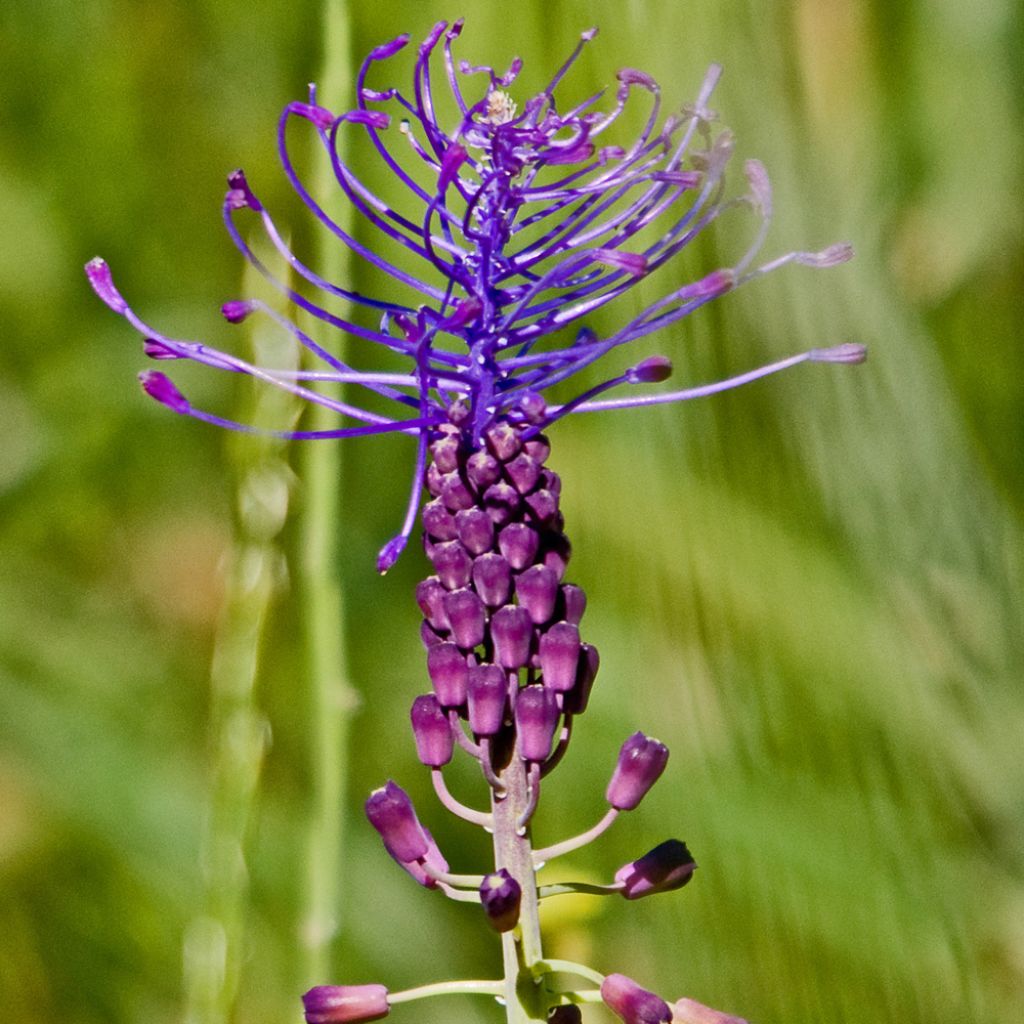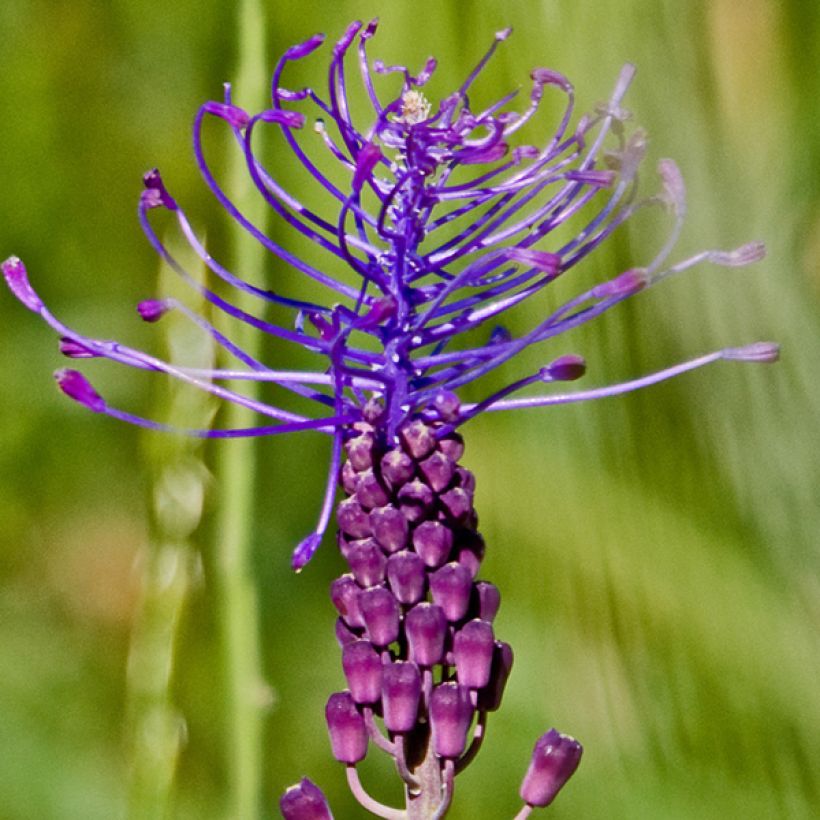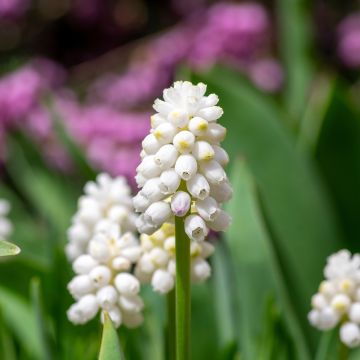

Muscari comosum - Muscari à toupet
Muscari comosum - Grape Hyacinth
Muscari comosum
Tassel Hyacinth, Tassel Grape Hyacinth
Out of 5 bulbs, 3 sprouted. The young plants were rather thin, but I hope they might just need a bit more time to establish themselves.
Gabryel, 15/06/2025
Special offer!
Receive a €20 voucher for any order over €90 (excluding delivery costs, credit notes, and plastic-free options)!
1- Add your favorite plants to your cart.
2- Once you have reached €90, confirm your order (you can even choose the delivery date!).
3- As soon as your order is shipped, you will receive an email containing your voucher code, valid for 3 months (90 days).
Your voucher is unique and can only be used once, for any order with a minimum value of €20, excluding delivery costs.
Can be combined with other current offers, non-divisible and non-refundable.
This plant carries a 6 months recovery warranty
More information
We guarantee the quality of our plants for a full growing cycle, and will replace at our expense any plant that fails to recover under normal climatic and planting conditions.
Would this plant suit my garden?
Set up your Plantfit profile →
Description
Muscari comosum, also known as Grape Hyacinth, is a beautiful and curious little bulbous plant, appreciated by gardeners for its spikes of small cream-brown bell-shaped flowers, topped with a lovely feathery tuft of filaments of deep blue to violet sterile flowers. It will work well in a rockery, along a path, or in a natural-looking flower bed. Hardy and easy to grow, it thrives in well-drained but fertile soil, in full sun.
Also called Clustered Hyacinth, Muscari comosum is a plant from the lily family, native to North America and central and southern Europe. The linear leaves, which resemble those of leeks, are linear and form an erect clump that reaches 15 cm (6in) high. In April-May, depending on the climate, curious inflorescences appear on long stems that can exceed 30 cm (12in) high. The lower part of the inflorescences consists of clusters of small cream-brown fertile bell-shaped flowers, while the upper part features filaments carrying sterile, deep blue to violet flowers, which are intense in the light. The terminal plume-like arrangement of these flowers is what gave this Muscari its common name. This bulb naturalises easily in light soil.
Plant Muscari comosum in mass plantings, in groups of about ten bulbs, for a carpet-like effect or along a path to achieve a decorative impact. They can also be randomly naturalised in a lawn and at the base of shrubs. They will greatly the well-drained soil of a rockery and the full sun it provides. Their flowering offers a beautiful range of blues, which will enhance the beauty of all other spring bulbs. They pair well with daffodils and wood anemones to create delicate scenes. Pink or white tulips are also good companions for their graceful flowers. In a nature-inspired garden, they need little maintenance, just like ornamental garlic, Verbascum, Stachys, wild chicory, or sainfoin.
Report an error about the product description
Muscari comosum - Grape Hyacinth in pictures


Plant habit
Flowering
Foliage
Botanical data
Muscari
comosum
Hyacinthaceae
Tassel Hyacinth, Tassel Grape Hyacinth
Mediterranean
Other Muscari
View all →Planting and care
Muscari comosum is best planted in autumn, at a depth of 8 cm (3in) with a spacing of 7 cm (3in), in regular but well-drained soil, in full sun. In very heavy soils, add sand or even gravel when planting. Moist soil saturated with water causes diseases that are fatal to the plant. Divide the clumps every 5 years, in June when the leaves turn yellow.
Planting period
Intended location
Care
-
, onOrder confirmed
Reply from on Promesse de fleurs
Haven't found what you were looking for?
Hardiness is the lowest winter temperature a plant can endure without suffering serious damage or even dying. However, hardiness is affected by location (a sheltered area, such as a patio), protection (winter cover) and soil type (hardiness is improved by well-drained soil).

Photo Sharing Terms & Conditions
In order to encourage gardeners to interact and share their experiences, Promesse de fleurs offers various media enabling content to be uploaded onto its Site - in particular via the ‘Photo sharing’ module.
The User agrees to refrain from:
- Posting any content that is illegal, prejudicial, insulting, racist, inciteful to hatred, revisionist, contrary to public decency, that infringes on privacy or on the privacy rights of third parties, in particular the publicity rights of persons and goods, intellectual property rights, or the right to privacy.
- Submitting content on behalf of a third party;
- Impersonate the identity of a third party and/or publish any personal information about a third party;
In general, the User undertakes to refrain from any unethical behaviour.
All Content (in particular text, comments, files, images, photos, videos, creative works, etc.), which may be subject to property or intellectual property rights, image or other private rights, shall remain the property of the User, subject to the limited rights granted by the terms of the licence granted by Promesse de fleurs as stated below. Users are at liberty to publish or not to publish such Content on the Site, notably via the ‘Photo Sharing’ facility, and accept that this Content shall be made public and freely accessible, notably on the Internet.
Users further acknowledge, undertake to have ,and guarantee that they hold all necessary rights and permissions to publish such material on the Site, in particular with regard to the legislation in force pertaining to any privacy, property, intellectual property, image, or contractual rights, or rights of any other nature. By publishing such Content on the Site, Users acknowledge accepting full liability as publishers of the Content within the meaning of the law, and grant Promesse de fleurs, free of charge, an inclusive, worldwide licence for the said Content for the entire duration of its publication, including all reproduction, representation, up/downloading, displaying, performing, transmission, and storage rights.
Users also grant permission for their name to be linked to the Content and accept that this link may not always be made available.
By engaging in posting material, Users consent to their Content becoming automatically accessible on the Internet, in particular on other sites and/or blogs and/or web pages of the Promesse de fleurs site, including in particular social pages and the Promesse de fleurs catalogue.
Users may secure the removal of entrusted content free of charge by issuing a simple request via our contact form.
The flowering period indicated on our website applies to countries and regions located in USDA zone 8 (France, the United Kingdom, Ireland, the Netherlands, etc.)
It will vary according to where you live:
- In zones 9 to 10 (Italy, Spain, Greece, etc.), flowering will occur about 2 to 4 weeks earlier.
- In zones 6 to 7 (Germany, Poland, Slovenia, and lower mountainous regions), flowering will be delayed by 2 to 3 weeks.
- In zone 5 (Central Europe, Scandinavia), blooming will be delayed by 3 to 5 weeks.
In temperate climates, pruning of spring-flowering shrubs (forsythia, spireas, etc.) should be done just after flowering.
Pruning of summer-flowering shrubs (Indian Lilac, Perovskia, etc.) can be done in winter or spring.
In cold regions as well as with frost-sensitive plants, avoid pruning too early when severe frosts may still occur.
The planting period indicated on our website applies to countries and regions located in USDA zone 8 (France, United Kingdom, Ireland, Netherlands).
It will vary according to where you live:
- In Mediterranean zones (Marseille, Madrid, Milan, etc.), autumn and winter are the best planting periods.
- In continental zones (Strasbourg, Munich, Vienna, etc.), delay planting by 2 to 3 weeks in spring and bring it forward by 2 to 4 weeks in autumn.
- In mountainous regions (the Alps, Pyrenees, Carpathians, etc.), it is best to plant in late spring (May-June) or late summer (August-September).
The harvesting period indicated on our website applies to countries and regions in USDA zone 8 (France, England, Ireland, the Netherlands).
In colder areas (Scandinavia, Poland, Austria...) fruit and vegetable harvests are likely to be delayed by 3-4 weeks.
In warmer areas (Italy, Spain, Greece, etc.), harvesting will probably take place earlier, depending on weather conditions.
The sowing periods indicated on our website apply to countries and regions within USDA Zone 8 (France, UK, Ireland, Netherlands).
In colder areas (Scandinavia, Poland, Austria...), delay any outdoor sowing by 3-4 weeks, or sow under glass.
In warmer climes (Italy, Spain, Greece, etc.), bring outdoor sowing forward by a few weeks.






























